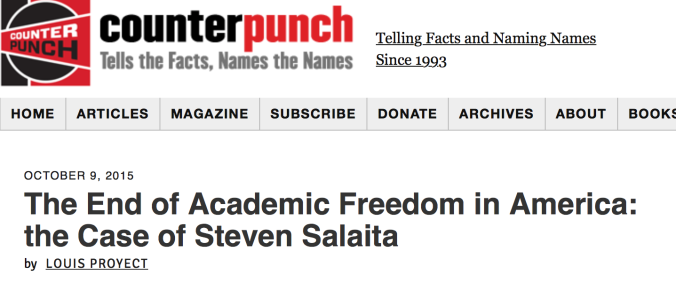Recently a friend on Facebook, who, noting my concern for the sorry state of free speech in academia despite not being in academia, challenged me to share the story of Steven Salaita, a controversial former professor of American Indian studies at Virginia Tech, as noted somewhat in CounterPunch.
The article does a poor job of describing what the case against Steven Salaita exactly was, save for a brief mention of his criticism of the “Support our Troops” slogan in a 2013 article he wrote for Salon (because of course), and a vague reference to some mean tweets by him.
I had to search elsewhere to learn that the University of Illinois board of trustees voted 8-1 to withdraw a job offer to Salaita over a series of tweets about Israel one would-be colleague criticized as “sophomoric, bombastic, or anti-semitic“:
Salaita condenses boycott-divestment-sanctions wisdom into a continuing series of sophomoric, bombastic, or anti-Semitic tweets: “UCSCdivest passes. Mark Yudoff nervously twirls his two remaining hairs, puts in an angry call to Janet Napolitano” (May 28, 2014); “10,000 students at USF call for divestment. The university dismisses it out of hand. That’s Israel-style democracy” (May 28, 2014); “Somebody just told me F.W. DeKlerk doesn’t believe Israel is an apartheid state. This is what Zionists have been reduced to” (May 28, 2014); “All of Israel’s hand-wringing about demography leads one to only one reasonable conclusion: Zionists are ineffective lovers” (May 26, 2014); “Universities are filled with faculty and admins whose primary focus is policing criticism of Israel that exceeds their stringent preferences” (May 25, 2014); “‘Israel army’ and ‘moral code’ go together like polar bears and rainforests” (May 25, 2014); “Keep BDS going! The more time Israel spends on it, the fewer resources it can devote to pillaging and plundering” (May 23, 2014); “So, how long will it be before the Israeli government starts dropping white phosphorous on American college campuses?” (May 23, 1014); “Even the most tepid overture to Palestinian humanity can result in Zionist histrionics” (May 21, 2014); “All life is sacred. Unless you’re a Zionist, for whom most life is a mere inconvenience to ethnographic supremacy” (May 20, 2014); “I fully expect the Israeli soldiers who murdered two teens in cold blood to receive a commendation or promotion” (May 20, 2014); “Understand that whenever a Zionist frets about Palestinian violence, it is a projection of his own brute psyche” (May 20, 2014); “I don’t want to hear another damn word about ‘nonviolence.’ Save it for Israel’s child-killing soldiers” (May 19, 2014); “I stopped listening at ‘dialogue’ ” (May 27, 2014). The last example here presumably advises BDS students how interested they should be in conversations with people holding different views.
More recently he has said “if Netanyahu appeared on TV with a necklace made from the teeth of Palestinian children, would anyone be surprised” (July 19, 2014) and “By eagerly conflating Jewishness and Israel, Zionists are partly responsible when people say anti-Semitic shit in response to Israeli terror” (July 18, 2014). The following day he offered a definition: “Zionists: transforming ‘anti-Semitism’ from something horrible into something honorable since 1948” (July 19).
The author, Cary Nelson, also explains why he thinks this is not an issue of academic freedom:
I should add that this is not an issue of academic freedom. If Salaita were a faculty member here and he were being sanctioned for his public statements, it would be. But a campus and its faculty members have the right to consider whether, for example, a job candidate’s publications, statements to the press, social media presence, public lectures, teaching profile, and so forth suggest he or she will make a positive contribution to the department, student life, and the community as a whole.
I’m not convinced by this reasoning because the first point of attack enemies of free speech seem to turn towards is to target someone’s livelihood, to get them fired or blacklisted because of an opinion they share. “Freedom of speech doesn’t mean freedom of consequences” the enemies of free speech say, which I hate as it’s a least clear to me that threats of poverty and starvation are an end run around free speech rights and a degradation of a free speech culture which is necessary to human liberty. The most sinister form of this sentiment are the squishy, thinly veiled justifications for the Charlie Hebdo murders.
Apparently Salaita has no problem with doing what he can to make sure Israeli scholars are kept out of academia in the US. For that, there is certainly some schadenfreude in knowing he’s so incensed by what I’m sure he and his supporters undoubtedly see as a violation of his academic freedom, that he’s suing the university in federal court. Of course what some may see as a “misplaced”, “liberal obsession” with “academic freedom” (palpable air quotes courtesy of the Harvard Crimson) suddenly becomes an unwavering bedrock principle the moment someone they like faces retaliation for voicing an opinion they like. Academic freedom for me, but not for thee, it seems.
But despite Salaita’s double standards, I hope he wins because free speech is a foundational component of academic freedom and should be seen as a non-negotiable bedrock principle for the pursuit of knowledge and the open exchange of ideas, especially on American universities. This includes people who say things which might upset or offend people. However stupid I think of what he says, I don’t have to defend what Salaita says to disagree with any retaliation he faces for it.
I strongly defend free speech rights even for those I loathe, such as the authoritarian, regressive ultra-leftists who seem to have struck a sort of Hitler-Stalin pact with Islamist extremists, anti-Semites, and Holocaust deniers.
Yes, the case of Steven Salaita is relevant to free speech and academic freedom.
